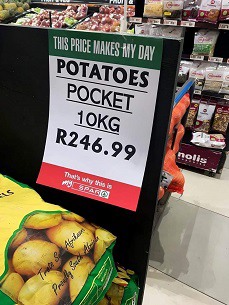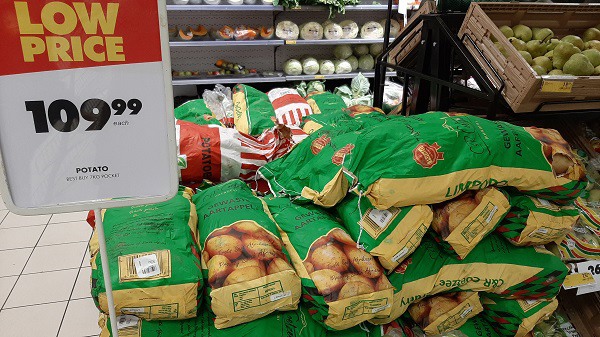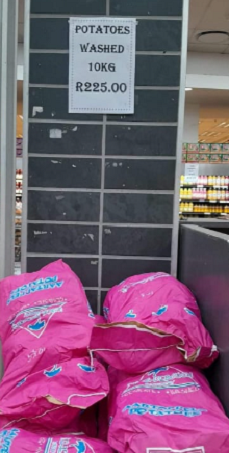World Food Day was commemorated with a new sense of urgency in South Africa, spurred by research commissioned by the Shoprite retail group that suggests that 49% of South Africans will go hungry at night in two years' time.
The figures are stark: according to the Shoprite Food Index, 21% of South African children will be stunted due to malnutrition.
South African consumers love potatoes, remarks Thabile Nkunjana, an economist at the National Agricultural Marketing Council, and potatoes have become a staple dish for many people across the country, but have become unaffordable for many.
 On social media consumers share pictures of previously unimaginable prices which retailers still dress up as bargains.
On social media consumers share pictures of previously unimaginable prices which retailers still dress up as bargains.
Right: "Well, I stood there, with my hands stretched out over these potatoes, obviously grown in gold dust": an East Rand consumer reacts on Facebook to 13 euros for a 10kg bag
“Normally, the current high potato prices are observed when there is a transition period which is around this time,” Thabile says.
Optimistic outlook for Limpopo potato yields
Potatoes South Africa, the industry body, last week noted that Limpopo potato farmers were looking forward to "a notable boost" in production.
"This optimistic outlook follows a less-than-ideal growing season in the region due to unusually cold weather during the previous harvest."
Limpopo potato growers are now full in production and consumers can hope to see a softening in prices.
At least 80% of South Africa's potatoes are grown under irrigation, and power outages induce intermittent irrigating, which had a negative impact on productivity, particularly in drier areas. In certain areas yields were down, compounding the shortage.
But, Thabile emphasises, it is difficult to blame a single factor for the high prices of potatoes and potato products.
 The 'low' price of R109,99 (5.8 euros) for a 7kg bag in the Western Cape
The 'low' price of R109,99 (5.8 euros) for a 7kg bag in the Western Cape
“Additionally, farmers were sceptical about planting larger areas due to higher input costs late in 2022 to beginning of 2023, particularly fertilizers, and slightly lower potato prices at times in 2022.”
Other commodities had displayed higher profitability than potatoes during the previous year, noted Potatoes SA's press release, prompting a reduction in potato hectares.
SA instates permanent French fry anti-dumping duties
Processed potato products have been a contested space in South Africa.
The local industry which receives no state subsidies complained of dumping by Belgium, the Netherlands and Germany. (Frozen potato products are also imported in smaller volumes from the United States and India.)
 “In the first five months of 2022, the imports [of frozen potato chips] from the [first] three countries grew by 114% compared to the corresponding period in 2021," Thabile wrote in an op ed last year.
“In the first five months of 2022, the imports [of frozen potato chips] from the [first] three countries grew by 114% compared to the corresponding period in 2021," Thabile wrote in an op ed last year.
Right: "How on earth can [retailer] ask this for a bag of potatoes" asks a KwaZulu-Natal consumer (12 euros for 10kg)
"This sharp rise in imports can be attributed to the expiration of anti-dumping tariffs in the first quarter of 2021 coinciding with a high potato harvest in the European countries. Of the roughly 30,000 tonnes imported in 2021, Belgium accounted for 67%, Netherlands (17%), and Germany (10%).”
At the moment South Africa has put anti-dumping duties on specific Belgian, German and Dutch companies (case-by-case ranging between 8% and 239%) and the playing field has been more level for South African farmers.
The Dutch royal couple are visiting South Africa at the moment.
"In the meeting between President Ramaphosa and the Dutch royalty discussions are likely to cover several issues including trade of agricultural products of which the two countries have had a great relationship over the years because of the history and cultures," Thabile remarks.










